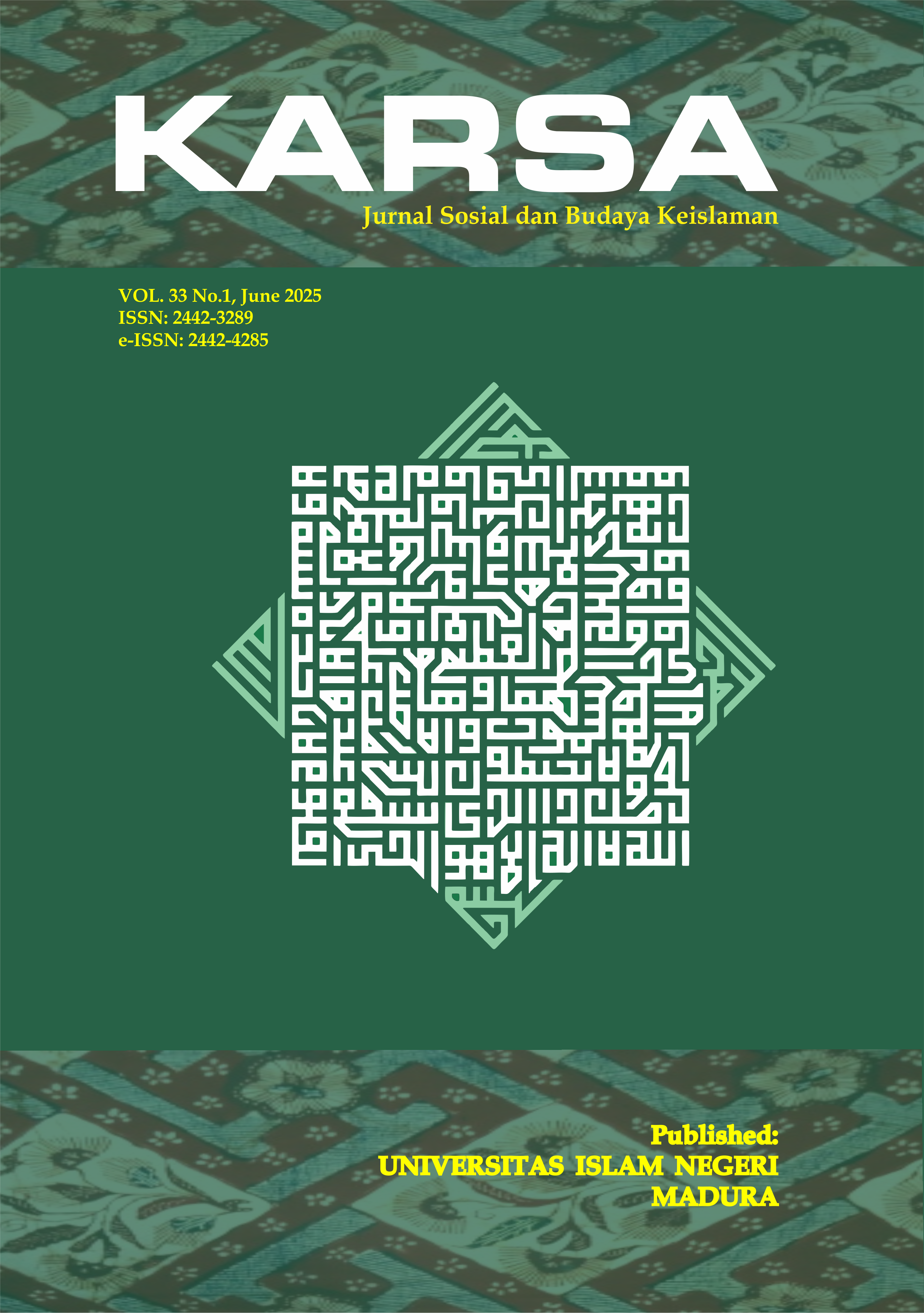Gili Trawangan's Tourism Landscape: Understanding The Contestation between MSMEs, Government, and Visitors
 Abstract views: 461
,
Abstract views: 461
,
 PDF downloads: 161
PDF downloads: 161
Abstract
This study investigates the dynamics of interactions among stakeholders in shaping MSME actors' business orientation in Gili Trawangan regarding acceptance and rejection of halal certification on food and beverage products. Using a qualitative approach and case study method, data were collected through participant observation over two months and in-depth interviews with 18 key informants, including MSME actors, government representatives, and tourists. The study explores how MSME actors' attitudes amid contestation between the government as an institutional stakeholder and tourists as primary stakeholders influence decisions to accept or reject halal certification. Findings show that the dominance of primary stakeholders, namely tourists, is the main factor shaping MSME business orientation, which tends to follow tourists' preferences in offering food and beverage products. Conversely, the government's function as an institutional stakeholder in promoting halal certification is less effective, leading MSMEs to resist certification and rely on traditional halal-based offerings and product diversification into non-halal items to attract various tourist segments. This research contributes significantly to understanding power relations and interests among stakeholders in MSME management within tourism and policy implications related to halal certification. Limitations include geographic scope, focus on certain MSME groups in Gili Trawangan, and reliance on data subjectively reported by informants. Future research should broaden the context and include diverse MSME groups in different regions to obtain a more comprehensive picture of stakeholder influence on business orientation.
Downloads
References
Akbarzadeh, Shahram. “The Muslim Question in Australia: Islamophobia and Muslim Alienation.” Journal of Muslim Minority Affairs 36, no. 3 (2016): 323–33. https://doi.org/10. 1080/13602004.2016.1212493.
Anker, Thomas Boysen. “Meaningful Choice: Existential Consumer Theory.” SAGE Open 14, no. 1 (2024): 1–20. https://doi.org/10. 1177/14705931231207317.
Anggarkasih, Made Gayatri, and Prima Sukmana Resma. “The Importance of Halal Certification for the Processed Food by SMEs to Increase Export Opportunities.” E3S Web of Conferences 348 (2022).
Ansell, Christopher, and Jacob Torfing. Handbook on Theories of Governance. Cheltenham: Edward Elgar Publishing, 2016.
Asyari, Akhmad, Kadri, and Jumarim. “Beragama Di Pulau Pariwisata Internasional: Pengalaman Toleransi Komunitas Muslim Di Lombok, Nusa Tenggara Barat.” MANAZHIM: Jurnal Manajemen dan Ilmu Pendidikan 4, no. 2 (2022): 475–90. https://doi.org/10.36088/manazhim.v4i2.2021.
Baihaqi, M. “Respon Pelaku Wisata Terhadap Peraturan Daerah NTB Nomor 2 Tahun 2016 Tentang Pariwisata Halal (Studi Di Kawasan Wisata Gili Trawangan Lombok Utara).” Universitas Islam Negeri Mataram, 2018.
Baihaqi, Muh. “Wisata Halal Di Gili Trawangan Lombok Utara.” J-EBIS (Jurnal Ekonomi Dan Bisnis Islam) 4, no. 2 (2019): 166–82. https://doi.org/10.32505/v4i2.1257.
Biancone, Paolo Pietro, Silvana Secinaro, Maha Radwan, and Mohamad Kamal. “Halal Tourism: An Opportunity for the Global Tourism Industry.” Tourism Analysis 24, no. 3 (2019): 395–404. https://doi.org/10.3727/108354219X15511865533112.
Cirjakovic, Vladimir. “Impacts of Recreational Activities on Marine and Coastal Areas in Gili Trawangan, Indonesia.” Bogor Agricultural University, 2015.
Creswell, John W. Penelitian Kualitatif & Desain Riset: Memilih Di Antara Lima Pendekatan. Edited by 3. Yogyakarta: Pustaka Pelajar, 2014.
Fahrurrozi. “Tuan Guru and Social Change in Lombok, Indonesia.” Indonesia and the Malay World 46, no. 135 (2018): 117–34. https://doi.org/10.1080/13639811.2018.1452487.
Fathurrahim, Fathurrahim. “Implementasi Perda Wisata Halal Nomor 2 Tahun 2016 Di Pulau Lombok.” Media Bina Ilmiah 16, no. 1 (2021): 6231–38. https://doi.org/10.33758/mbi.v16i1.1226.
Fealy, Greg. “Consuming Islam: Commodified Religion and Aspirational Pietism in Contemporary Indonesia BT - Expressing Islam: Religious Life and Politics in Indonesia.” edited by Greg Fealy and Sally White, 15–39. Singapore: Institute of Southeast Asian Studies, 2008.
Freeman, R Edward. “Five Challenges to Stakeholder Theory: A Report on Research in Progress.” Edited by Sergiy D Dmytriyev and R Edward Freeman. R. Edward Freeman’s Selected Works on Stakeholder Theory and Business Ethics, 2023, 301–17. https://doi.org/10.1007/978-3-031-04564-6_16.
Fuadi, Moh Ashif. “Religious Moderation in the Context of Integration between Religion and Local Culture in Indonesia.” Journal of Al-Tamaddun 19, no. 1 (2024): 47–59. https://doi.org/10.22452/JAT .vol19no1.4.
Gupta, Vikas, and Karishma Sharma. “An Analytical Hierarchical Process Approach to Assessing Local Food Preferences among Foreign Tourists.” British Food Journal 127, no. 1 (2024): 11–33. https://doi.org/10.1108/BFJ-11-2023-0973.
Haleem, Abid, and Mohd Imran Khan. “Towards Successful Adoption of Halal Logistics and Its Implications for the Stakeholders.” British Food Journal 119, no. 7 (2017): 1592–1605.
Haryanegara, Muhammad Endriski Agraenzopati, Muhamad Adibagus Ilham Akbar, and Evi Novianti. “The Role of Halal Tourism Label as a Cultural Tourism Attraction in Lombok, West Nusa Tenggara.” Tornare: Journal of Sustainable and Research 3, no. 1 (2021): 35–39. https://doi.org/10.24198/tornare.v3i1.29839.
Hasyim, Syafiq. The Halal Project in Indonesia: Shariatization, Minority Rights and Commodification. Singapore: ISEAS – Yusof Ishak Institute, 2022.
Hennink, Monique, Inge Hutter, and Ajay Bailey. Qualitative Research Methods. London: SAGE Publications, 2020.
Hosen, Nadirsyah. “Religion and the Indonesian Constitution: A Recent Debate.” Journal of Southeast Asian Studies 36, no. 3 (2005): 419–40. https://doi.org/10.1017/S0022463405000238.
Hussein, Shakira. “Not Eating the Muslim Other: Halal Certification, Scaremongering, and the Racialization of Muslim Identity.” International Journal for Crime, Justice and Social Democracy 4, no. 3 (2015): 85–96. https://doi.org/10.5204/ijcjsd.v4i3.250.
Islam, Mohammad Mominul, Mohamed Syazwan Ab Talib, and Nazlida Muhamad. “Challenges of Halal Standards and Halal Certification for Islamic Marketing.” Muslim Business and Economics Review 2, no. 1 (2023): 105–24. https://doi.org/10. 56529/mber.v2i1.156.
Jakiyudin, Ahmad Havid, and Alfarid Fedro. “Sehati: Peluang Dan Tantangan Pemberian Sertifikasi Halal Gratis Bagi Pelaku UMK Di Indonesia.” Al-Mustashfa: Jurnal Penelitian Hukum Ekonomi Islam 7, no. 2 (2022): 182–94. https://doi.org/10.29313/al-mustashfa.v7i2.10666.
Kadri, Kadri. “Manajemen Dakwah Ramah Pariwisata Berbasis Masjid Di Gili Trawangan, Lombok.” Tasâmuh 18, no. 1 (2020): 29–53. https://doi.org/10.20414/tasamuh.v18i1.1986.
———. “Religion and Tourism: Promoting Inclusive Islam in Lombok Island, Indonesia.” Studia Islamika 29, no. 2 (2022): 333–57. https://doi.org/10.36712/sdi.v29i2.14471.
Ladiqi, Suyatno. “Globalization and the Rise of Cosmopolitan Shariah: The Challenge and Opportunity of Halal Tourism in Indonesia.” NAMSCA Herald 1 (2018): 904–7.
Liu, Yuefengting. “A Review of the Basic Theory of the Great Michael Porter’s Positioning School BT-Proceedings of the 5th International Conference on Economic Management and Green Development,” 265–71. Singapore: Springer, 2025. https://doi. org/10.1007/978-981-19-0564-3_28.
Majid, Nurcholish. Islam, Kemodernan, Dan Keindonesiaan. Bandung: Mizan, 1987.
Mpofu, Thomas P Z. “An Assessment of the Impact of Tourism Globalization in Africa.” Journal of Business and Administrative Studies 1, no. 2 (2009): 1–19. https://doi.org/10.4314/jbas.v1i2. 57346.AJOL+2.
Munawar, Said Agil Husin Al. Fikih Hubungan Antar Agama. Jakarta: Ciputat Press, 2003.
Muquita, Namira Risqi Putri. “Dampak Pariwisata Halal Terhadap Persepsi Islamofobia Wisatawan Asing Di Kawasan Asia Tenggara.” Jurnal Ilmiah Pariwisata Halal 1, no. 1 (2023): 1–15. https://eprints.unram.ac.id/39872/2/Namira Risqi Putri Muquita_ Artikel_Jurnal.pdf.
Nashuddin, Nashuddin. “The Management of Muslim Spiritual Tourism in Lombok, Indonesia: Opportunities and Challenges.” Journal of Indonesian Islam 10, no. 2 (2016): 213–36. https://doi. org/10.15642/JIIS.2016.10.2.213-236.
Porter, Michael E, and James E Heppelmann. “Why Every Organization Needs an Augmented Reality Strategy.” Harvard Business Review 95, no. 6 (2017): 46–57. https://hbr.org/2017/11/ why-every-organization-needs-an-augmented-reality-strategy.
Prawiro, Atmo, and Fathudin. “Challenges in the Halal Industry Ecosystem: Analyzing the Halal Certification Process for Micro, Small, and Medium Enterprises in Lombok, West Nusa Tenggara.” Mazahib 22, no. 2 (2023): 431–84. https://doi.org/10. 21093/mj.v22i2.7010.
Putera, Rachmat Panca. “Pemikiran Politik Islam Di Indonesia: Dari Formalistik Menuju Ke Substantif.” Ri’ayah: Jurnal Sosial Dan Keagamaan 3, no. 1 (2018): 59. https://e-journal.metrouniv.ac.id/ riayah/article/view/1179.
Rachman, Abdul, and Lukman Santoso Az. “Digitalizing Halal Certification: The Dynamic of Regulations and Policies Concerning Halal Certification in Indonesia.” Jurisdictie: Journal of Law and Sharia 14, no. 2 (2023): 265–93. https://doi.org/10.18860/j.v14i2.24115.
Rasul, Tareq. “The Trends, Opportunities and Challenges of Halal Tourism: A Systematic Literature Review.” Tourism Recreation Research 44, no. 4 (2019): 434–50. https://doi.org/10.1080/ 02508281.2019.1599532.
Rios, Rosa E, Hernan E Riquelme, and Yasser Abdelaziz. “Do Halal Certification Country of Origin and Brand Name Familiarity Matter?” Asia Pacific Journal of Marketing and Logistics 26, no. 5 (2014): 665–86.
Silverman, David. Qualitative Research. London: SAGE Publications, 2020. https://www.torrossa.com/en/resources/an/5019251.
Smith, Terry. “The Existential Consumption Paradox: An Exploration of Meaning in Marketing.” The Marketing Review 7, no. 4 (2007): 325–41. https://doi.org/10.1362/146934707X251092.
Spradley, James P. Metode Etnografi. Edited by Misbah Zulfa (Translator) Elizabeth. Yogyakarta: Tiara Wacana Yogya, 1997.
Utama, I G B R, C P Trimurti, J Pramono, and N P D Krismawintari. “Tourist Behavior Destination Selection Model.” International Journal of Advanced Science and Technology 29, no. 5 (2020): 7352–75.
Wahid, Abdul. “Agama Dalam Pusaran Pariwisata: Refleksi Dari Gili Trawangan.” Alamtara Institute (Blog), n.d. https://alamtara.co/ 2023/03/26/agama-dalam-pusaran-pariwisata-refleksi-dari-gili-trawangan/.
Wahid, Abdurrahman. Pribumisasi Islam. Jakarta: P3M, 1989.
Wandhini, Amalia Fiqia, Dwi Dayanti Astri, and Lailatul Nafiah Iskandar. “Halal Tourism in Bali: Pengaruh Dan Tantangan Mengembangkan Wisata Halal Di Bali.” ACTIVA: Jurnal Ekonomi Syariah 2, no. 2 (2019): 1–21. https://jurnal.stitnual hikmah.ac.id/index.php/activa/article/view/488.
Wannasupchue, Wannasiri, Siti Fatimah Mohamad, Farah Adibah Che Ishak, and Ungku Fatimah Ungku Zainal Abidin. “Challenges to Obtain Halal Certification among Restaurants in Northeast Thailand.” Journal of Islamic Marketing 14, no. 2 (2023): 607–21. https://doi.org/10.1108/JIMA-04-2021-0124.
Wilson, Jonathan A J. “The Halal Phenomenon: An Extension or a New Paradigm?” Social Business 4, no. 3 (2014): 255–71. https://doi. org/10.1362/204440814X14103454934294.
Yuanitasari, Deviana, Agus Sardjono, and Heru Susetyo. “Tantangan Regulasi Halal Untuk Pelaku Usaha Mikro Dan Kecil: Sebuah Studi Socio-Legal Di Kupang Nusa Tenggara Timur.” Acta Diurnal Jurnal Ilmu Hukum Kenotariatan 6, no. 2 (2023): 254–67.
Yulianto, G, A Fahrudin, and N Kusumaningsih. “Recreational Demand Analysis and Marine Tourism Development Strategy in Gili Trawangan, West Lombok Regency, West Nusa Tenggara Province.” Bulletin of Fisheries Economics 7, no. 2 (2007): 1–15.
Zada, Khamami. “Muslim Youth Under Sharia Regime in Aceh: From Accommodation to Resistance.” AL-IHKAM: Journal of Law & Social Institutions 17, no. 2 (2022): 412–33. https://doi.org/10. 19105/al-lhkam.v17i2.7262.
Zaenuri, Lalu Ahmad. “Dakwah Strategies of Sharia Tourism: The Case of Gili Air, North Lombok.” Ulumuna: Journal of Islamic Studies 22, no. 2 (2018): 237–54. https://doi.org/10.20414/ujis.v22i2. 327.
Zein, Fitriyani. “Halal Certification in Government and Non-Governmental Organizations: A Comparative Analysis of Indonesia, Malaysia, and Thailand.” Journal of Halal Studies 1, no. 1 (2022): 25–40. https://doi.org/10.22555/jhs.v1i1.90.
The journal operates an Open Access policy under a Creative Commons Non-Commercial Share-Alike license. Authors who publish with this journal agree to the following terms:
- Authors retain copyright and grant the journal right of first publication with the work simultaneously licensed under a Creative Commons Attribution License that allows others to share the work with an acknowledgement of the work's authorship and initial publication in this journal.
- Authors are able to enter into separate, additional contractual arrangements for the non-exclusive distribution of the journal's published version of the work (e.g., post it to an institutional repository or publish it in a book), with an acknowledgement of its initial publication in this journal.
- Authors are permitted and encouraged to post their work online (e.g., in institutional repositories or on their website) prior to and during the submission process, as it can lead to productive exchanges, as well as earlier and greater citation of published work.














